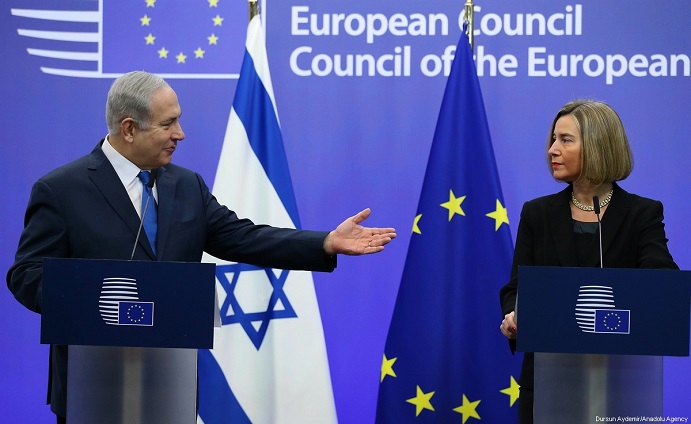
Middle East Monitor / February 18, 2020
For all its purported peace-building efforts and support for Palestinian rights, the EU is committed to supporting Israel’s colonial-settler expansionism. Its feeble response to US President Donald Trump’s so-called “deal of the century” was accentuated in the recent decision to refuse to pass any official resolutions until after next month’s Israeli General Election.
Palestine is never a priority in foreign policy anywhere. Yet the Palestinian Authority persists in pursuing non-existent international support, notably that of the EU, ostensibly to navigate the labyrinth of dispossession which the UN’s 1947 Partition Plan forced upon the people of Palestine. The truth is that the PA is scrambling to retain its bequeathed diplomatic standing and the funding that allows it to function as the “sole representative” of the Palestinians.
In return, the PA facilitates the waiting game for the international community, while Palestinians suffer statements such as the latest by EU Foreign Affairs Chief Josep Borrell. “We briefly discussed how best to relaunch a political process that is acceptable to both parties and how best to defend the internationally agreed parameters, equal rights and international law,” he declared on Monday. Defending internationally agreed parameters has nothing to do with protecting Palestinian rights, and PA leader Mahmoud Abbas is aware of this discrepancy.
Meanwhile, Israel is lobbying EU countries to refrain from taking a stance against Trump’s plan. Israeli media highlights the fact that recognition of the State of Palestine by several European countries has “little, if any, diplomatic effect.” While in previous years, recognition of Palestine raised Israel’s ire, it is now being touted as a futile PA effort in comparison with the US-Israeli partnership to colonise Palestine, as well as the EU’s increasingly non-committal stance towards Palestinians and their legitimate political rights.
Nevertheless, Israel will not take any risk that the EU might voice a unified condemnation of Trump’s plan. The delay communicated by the EU with regard to its response over US-Israeli scheming indicates diplomatic activity that favours Israel. The latter allegedly “fears” the EU playing a major role in any future negotiations. Netanyahu has pledged to carry out the annexation of the occupied West Bank if re-elected, and the EU has done nothing other than issue the usual bland condemnation. If the EU does indeed take on a more influential role in negotiations, whether these are based on the defunct two-state compromise or Trump’s proposal, it will clearly adopt a pro-Israel stance.
Behind the scenes, Israel is lobbying for such a scenario and there is nothing to impede the EU from continuing with its track record of marginalising Palestinians. Before Trump’s deal was revealed, EU diplomats attempted to differentiate between the allegedly law-abiding EU and the international law-abusing US. The illusion of a political struggle between both entities was the focus of analysis, which suited Israel as it shifted attention away from the Palestinians.
The final step in this process will matter little to Israel as long as the EU does not depart from its decades-long policy of pretending to support Palestinian rights while actively pursuing stronger ties with Israel. One point, however, must be clarified. If the EU is seeking additional delays before issuing a statement regarding the deal of the century, the words of former EU representative for Foreign Affairs Federica Mogherini words must be recalled: the EU would consider working with the US plan if the two-state paradigm is included. One obsolete imposition has now been replaced by another that offers fragments of a state, which the EU and its backing for Israeli expansionism has supported tacitly all along.
Ramona Wadi is an independent researcher, freelance journalist, book reviewer and blogger; her writing covers a range of themes in relation to Palestine, Chile and Latin America












